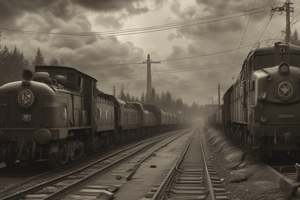Podcast
Questions and Answers
Which of these best defines 'total war' as it applies to the context of World War II?
Which of these best defines 'total war' as it applies to the context of World War II?
- A limited war with strategic objectives confined to a specific geographical region.
- A war focused solely on economic gain with minimal impact on civilian populations.
- A conflict characterized by the complete mobilization of a nation's resources, including its economy, military, society, and politics. (correct)
- A conflict where only military personnel are actively involved in combat operations.
How did Nazi Germany's approach to 'total war' affect its civilian population?
How did Nazi Germany's approach to 'total war' affect its civilian population?
- Civilians were exempted from labor efforts, enjoying a life of relative peacetime comforts.
- Civilians were largely unaffected, continuing their normal lives with minimal disruption.
- Civilians were mobilized for war efforts, facing rationing, bombings, and persecution, most notably through the Holocaust. (correct)
- Civilians saw a boom in economic development due to war production, and their status improved considerably.
What was a key component of the Nazi regime's control and mobilization efforts?
What was a key component of the Nazi regime's control and mobilization efforts?
- Promotion of individual freedoms and minimal government intervention in private industry.
- Emphasis on international cooperation and alliance-building.
- Use of propaganda, censorship, and the complete conversion of the economy to wartime production. (correct)
- Limited government control over education, with focus on maintaining civilian academic standards.
What was a significant measure taken by the United Kingdom to mobilize its population during World War II?
What was a significant measure taken by the United Kingdom to mobilize its population during World War II?
How did the war impact the daily lives of civilians in the United Kingdom?
How did the war impact the daily lives of civilians in the United Kingdom?
What role did the United States play, economically, in the context of World War II?
What role did the United States play, economically, in the context of World War II?
What was a direct result of the intense scientific and industrial effort in the United States during WWII?
What was a direct result of the intense scientific and industrial effort in the United States during WWII?
What best describes the overall extent of total war in Nazi Germany, the United Kingdom, and the United States?
What best describes the overall extent of total war in Nazi Germany, the United Kingdom, and the United States?
Flashcards
Total War
Total War
A type of warfare where all aspects of a nation's resources, including social, political, economic, and military elements, are fully dedicated to achieving victory. This encompasses the mobilization of the entire population and resources for the war effort.
Totalitarian Control
Totalitarian Control
The Nazi regime's comprehensive control over all aspects of German life.
Conversion of Economy
Conversion of Economy
The transformation of Germany's economy to focus on wartime production. This included prioritizing armaments, conscripting labor, and utilizing resources from conquered territories.
Mobilization of the Population (UK)
Mobilization of the Population (UK)
Signup and view all the flashcards
Women's Role in Wartime (UK)
Women's Role in Wartime (UK)
Signup and view all the flashcards
Economic Mobilization (US)
Economic Mobilization (US)
Signup and view all the flashcards
Manhattan Project
Manhattan Project
Signup and view all the flashcards
Extent of Total War
Extent of Total War
Signup and view all the flashcards
Study Notes
World War II as Total War: Essay Outline Study Notes
- Concept of "Total War": "Total war" involves complete mobilization of resources (economic, military, social, political) in a conflict. It's a crucial concept for understanding WWII's scale.
Nazi Germany and Totalitarian Control
- Nazi Regime's Control: The Nazi regime controlled every aspect of German life, using propaganda, censorship, education, and industry for war.
- War Economy: Germany transitioned its economy to focus on armaments and forced labor, including from occupied territories.
- Civilian Impact: Civilians were mobilized for war through rationing, bombings (like Berlin), and persecution of targeted groups like Jews and Romani.
- "Final Solution" and Lebensraum: The regime's plans for expansion and genocide exemplified its philosophy of total war.
- Extent of Total War in Germany: The war consumed every sector of German life with disastrous consequences.
United Kingdom and Total Mobilization
- UK's War Effort: The UK mobilized its people through conscription, child evacuation, and women's participation in wartime industries (like the Women's Land Army).
- Impact on Daily Life: Food, clothing, and fuel were rationed. Air raids during the Blitz extensively reshaped urban life (e.g., London).
- Extent: UK survival relied on total mobilization and integrating the civilian sector into the war effort.
United States and Industrial Mobilization
- US Economic Transition: The US economy converted from peacetime to wartime production ("Arsenal of Democracy"). It experienced a significant military production boom.
- Women and Minorities: Women played a crucial role in the workforce ("Rosie the Riveter"). Minority groups also participated, despite existing segregation.
- Manhattan Project: The project showcased the collaboration of scientists, engineers, and government resources to develop nuclear weapons.
- Extent of US Total War: Unprecedented mobilization affected all aspects of life and had global consequences.
Conclusion: Synthesizing Total War
- Different Approaches: Each nation's effort reflected unique political, social, and economic systems.
- Long-Term Impacts: WWII's total war legacy significantly reshaped the global order, influencing technology, politics, and society.
Studying That Suits You
Use AI to generate personalized quizzes and flashcards to suit your learning preferences.



